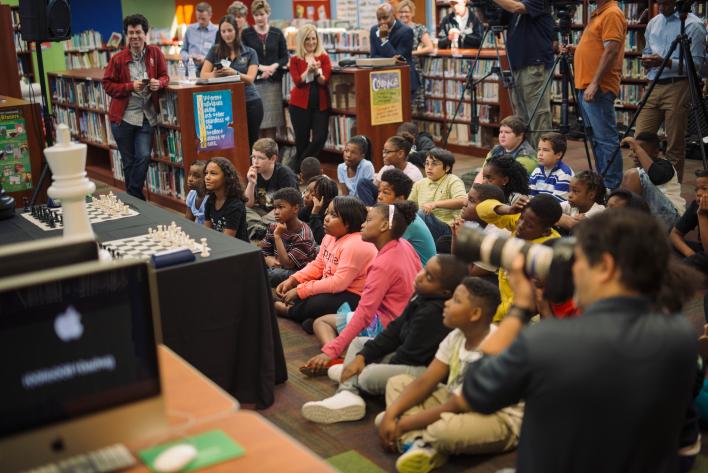
by Emily Sholtis & Matthew Pepper, Basis Policy Research
Chess is experiencing a renaissance. Thanks to the websites like Twitch, the rise of online chess, and the match between Garry Kasporov and Deep Blue, the game is at its most popular since Bobby Fischer and Boris Spassky faced off in the 70s. This surge in interest is perhaps most notable within education. Schools the world over are integrating chess into curriculums, employing chess techniques as learning strategies, and supporting chess as an extracurricular activity. To celebrate this, the research blog of the Chess Club and Scholastic Center of Saint Louis is starting a new series in which we explore the role of chess within schools across the globe. Each post will explore how chess is being used to enrich schools within a particular nation.
Inspired by our blog post on John Jerrim and team’s work on chess interventions in primary schools, our global tour of chess in schools starts in the United Kingdom. Since 1950, there have been 45 British grandmasters, the majority of which hail from England. In a global ranking of player ratings by country compiled by the World Chess Federation, England ranks 13th in the world. Currently British schools and organizations are training the next generation of grandmasters within their primary schools with the help of groups like Chess in Schools and Communities (CSC). This English non-profit endeavors “to raise the profile of chess and highlight its educational and social benefits”. In May, 2016, we spoke to CSC’s Research, Funding, and Communications Officer Daniel Young who was kind enough to answer our questions about the status of chess in schools within the United Kingdom via email.
To provide some context, British schools differ a fair bit from their American counterparts. While grade levels and years of schooling are similar, the UK has a more centralized school system with a national curriculum. This alters the feasibility of widespread implementation of chess programs within the UK. According to Daniel Young, however, apart from the work of the CSC “there’s little by way of accreditation for chess teachers or a standard curriculum, so there are as many teaching methods as there are schools teaching chess”.
Note: Some responses have been condensed and/or edited for the purposes of this blog.
Q1) Is chess part of the national curriculum and/or standards in the UK?
Chess isn't part of the UK's national curriculum at the present time, but there are some supporters. A motion in support of classroom chess was passed at a recent conference of the Association of Teachers and Lecturers, a national union for education professionals. There is also an All-Party Parliamentary Group with members from both Houses of Parliament and both major political parties. Chess hasn't received any state funding since the Government withdrew its grant to the English Chess Federation as a budget-saving measure about five years ago. As a result, most chess in UK schools is funded by the schools themselves. CSC does subsidize chess programs in schools from charitable funds.
Q2) Are there regions in the UK where chess is taught in all schools?
There are no areas where chess is taught in all schools, but CSC does have a contract with the London Borough of Newham to deliver chess to its primary schools. Currently we work with roughly half of those schools. This was launched in March 2013 as a charity-public-private partnership between Chess in Schools and Communities, Newham Borough Council, and East Village E20 (formerly the 2012 Olympic Village). The project aims to reach all 64 primary schools within the Borough, resulting in teaching 20,000 children how to play chess.
Q3) Can you give us more details on who is learning chess and how CSC is teaching students?
I can only speak with confidence for the schools taught by Chess in Schools and Communities of which there are approximately 300 across the nation. We think this constitutes the majority of chess teaching in UK schools. As a charity, we teach solely in government-funded schools (where chess is otherwise largely absent), the majority of which are primary schools that educate students between the ages of 7 and 11. We teach chess as a part of the regular school day as we have found that voluntary chess clubs tend to only attract boys. Our course consists of thirty, one-hour lessons to each class over the course of an academic year. We use our own curriculum, written by Richard James, and train our own tutors who teach chess within our partner schools. The majority of the tutors are individuals with a background in chess, though some school staff members are trained as well.
Our thanks to Daniel for his help with this blog post!
For more on the work Chess in Schools and Communities is doing visit their website here.


